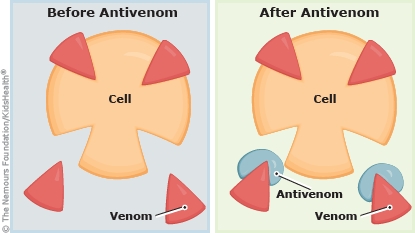Venom is a harmful liquid that some snakes and other animals make in their bodies. When a venomous snake bites someone, it injects venom into the skin. Venom attaches to areas on cells inside the body and makes changes to them. This can make the victim feel pain, swell up, bleed, and get very sick.
Your child was treated in the hospital for a venomous snake bite. The wound was cleaned well and your child may have been given IV (intravenous or into a vein) antivenom. Antivenom prevents the venom from attaching to cells and harming the body.



Your child:

Your child:

What is venom? Venom is the harmful substance that some animals inject into another animal (or person) by biting or stinging them. They do this to protect themselves or to catch prey. In the United States, only a few snakes make venom, including rattlesnakes, cottonmouths (also called water moccasins), copperheads, and coral snakes. Sometimes a venomous snake will bite without injecting venom.
What is antivenom? It's a liquid made from the antibodies (special proteins that are part of the immune system) of animals that have been exposed to small amounts of snake venom. When the antivenom is injected into someone who has been bitten by a venomous snake, the antibodies attach to the venom toxins and prevent them from harming the body.
What problems can a venomous snakebite cause? Venomous snakebites can cause problems that range from mild (skin wound or infection) to life-threatening (problems with the nervous system; the heart, lungs, and kidneys; blood clotting; and more).